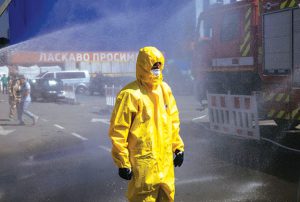Two decades ago, I spent more than two years sleeping a few decks above eight nuclear reactors onboard the Enterprise, the US Navy’s oldest nuclear-powered aircraft carrier. I was the rear admiral in command of the Enterprise’s strike group, and “broke my flag†and sailed to a long combat deployment.
I didn’t lose much sleep thinking about those reactors, because I knew how professional and meticulous the Navy was about operating them: All US submarines and carriers use nuclear propulsion. I spent a fair amount of time with our engineers and learned a great deal about the advantages and dangers of atomic power.
Today, I am losing sleep about the situation in Ukraine, where Russian President Vladimir Putin’s troops are occupying Europe’s largest nuclear power plant at Zaporizhzhia. Putin is truly playing with fire, and much of Europe (and Russia as well) are at significant risk of a nuclear incident with terrible long-term consequences. What should the international community do?
Russians have captured the entire nuclear complex in southeast Ukraine, and are doggedly holding on to it for three principal reasons. First, Putin sees the strategically located site, near the focus of Ukraine’s long-awaited offensive operations centered on the Kherson region, as a kind of sanctuary from which his forces can stage attacks. He believes that the Ukrainians won’t bombard the site given the risks of a radiation release.
Second, Putin is using the situation to intimidate the Europeans, in essence threatening a nuclear disaster like the Chernobyl crisis in 1986. Finally, he wants to be able to cut off Ukraine’s power grid ¬— Zaporizhzhia supplies a staggering 20% of the country’s electricity.
We don’t have to imagine what a radiation release could look like. We need only look back to Chernobyl, which was caused by structural and training failures. The effects were felt most directly in Ukraine, but significant radiation ended up in Belarus to the north and into Russia itself. Predicting deaths attributed to such a radiation event is difficult, but most sources believe thousands ended up dead or with severe health consequences, notably cancers. The costs of remediation approached $100 billion with over 330,000 evacuees.
More recently, in 2011, an earthquake and tsunami struck the Fukushima Daiichi nuclear power plant in Japan. The reactor failure and nuclear release was given the International Atomic Energy Agency’s most severe rating, level 7, equaling only Chernobyl. Despite massive civilian response and plenty of international assistance (including teams from the US Navy), thousands of people were affected, with over 150,000 evacuated.
Now imagine if there had been a war going on at either Chernobyl in 1986 or Fukushima in 2011. The toll of deaths and property costs would have been far higher, given the additional difficulty of getting relief forces and radiation mitigation solutions into the plants.
In the case of Zaporizhzhia, there are several paths to disaster. First would be a failure to operate the plant safely. Ukrainian workers are heroically keeping the plant functioning, under the guns of Russian occupiers. An error on their part — hardly unlikely given the pressures on site — could cause a cooling crisis leading to a meltdown.
Another obvious concern, one that nearly occurred just days ago, would be combat that knocks out the cooling system, which requires electricity, and destroys the backup diesel generators (which could also run out of fuel).
Finally, artillery fire could hit the containers of spent uranium on the site, creating a more localized but still dangerous radiation release. While we are assured that a full nuclear detonation could not occur, the long-term risks to people and infrastructure are obvious. Zaporizhzhia is truly a ticking time bomb.
What can be done to avoid a Chernobyl-type disaster? Most importantly, the international community must insist on a comprehensive inspection of the reactor.
—Bloomberg
James Stavridis is a Bloomberg Opinion columnist. A retired US Navy admiral, former supreme allied commander of Nato, and dean emeritus of the Fletcher School of Law and Diplomacy at Tufts University
 The Gulf Time Newspaper One of the finest business newspapers in the UAE brought to you by our professional writers and editors.
The Gulf Time Newspaper One of the finest business newspapers in the UAE brought to you by our professional writers and editors.

